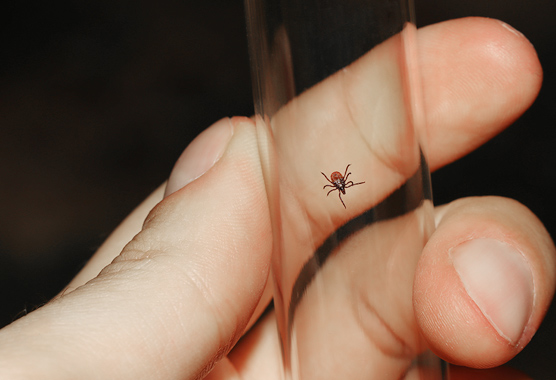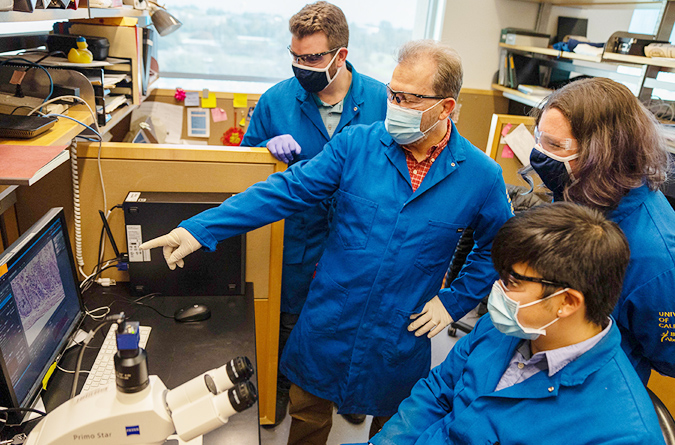Zoonotic Disease
UC Davis Health is at the forefront of diseases caused by animals (zoonoses). We deliver exceptional care and participate in research reducing their impact in our community and worldwide.
Medically reviewed by Daniel Dodson, M.D. on Nov. 06, 2023.

Zoonotic Disease Care
You may think it’s unlikely you’ll get sick from an animal, but zoonoses (diseases spread from animals to people) are common. They account for 6 out of every 10 infectious diseases in humans worldwide. Some zoonotic diseases can make you severely ill.
Receiving prompt care from experienced specialists can help you feel better. UC Davis Health’s Division of Infectious Diseases is home to experts specializing in zoonotic infections. We are easy to reach and deliver today’s best available treatments.
Our Difference
Expertise
You have access to some of the region’s foremost zoonotic disease experts. Our specialists completed the highest level of infectious disease training (fellowships) and are advancing the field through research. Their depth of experience helps you receive the highest level of care.
Leadership in Pandemic Prevention Research
UC Davis Health is among a select few programs partnering with a National Institutes of Health (NIH) research center to study wildlife zoonoses. Infectious disease researchers are working to detect flu strains with pandemic potential and reduce the likelihood of a worldwide outbreak.
Convenience
Primary care providers are often your first stop for signs of zoonotic infection, such as flu-like symptoms and severe diarrhea. Many UC Davis Health primary care providers offer same-day appointments. They coordinate additional services with infectious disease specialists if you have a rare or difficult-to-treat diagnosis.
What Are Zoonotic Diseases?
These are viruses, parasites, bacteria and fungi that spread from animals to humans. Even if you and the animal are both healthy, you can still get zoonotic infections.
Common Diseases Caused by Animals:
Bird Flu (Avian Influenza H5N1)
Avian influenza causes symptoms similar to seasonal flu, except it spreads through contact with an infected bird. The condition is treatable with antiviral medications.
Lyme Disease
This infection spreads through tick bites. It can cause rash, and less commonly joint inflammation, facial droop, meningitis, or heart problems. Early treatment can lower your risk of these issues.
Rabies
Rabies is a rare, often fatal condition that spreads through animal bites. It can cause seizures, hallucinations, rapid breathing (hyperventilation) and paralysis. If you have possibly been exposed to the rabies virus (such as through an animal or bat bite), you may be able to prevent infection by immediately getting post-exposure prophylaxis (PEP) with rabies vaccines and antibodies.
Causes of Zoonotic Infections
Zoonoses are spread from animal to humans through germs that may be in:
Contaminated Food and Water
Food or water with animal feces or urine can make you sick. The same is true of some animal-based food products such as undercooked meat and unpasteurized milk.
Direct Animal Contact
Coming into contact with an animal’s body fluids (saliva, urine, feces, birthing fluids, and mucus) can spread disease. You can also catch germs from bites and scratches.
Indirect Contact with Animals
Handling an animal’s living environment exposes you to its germs. This may involve changing a cat’s litter, cleaning a chicken coup, putting food or water in a dog bowl or giving a horse hay.
Preventing Zoonotic Infections
You can minimize the risk of diseases caused by animals. Wash your hands immediately after handling, cleaning or feeding a pet. You should also avoid contact with animals if you are sick or have a weakened immune system.
"Zoonotic Diseases," Centers for Disease Control and Prevention (CDC), https://www.cdc.gov/onehealth/basics/zoonotic-diseases.html
"Rabies Postexposure Prophylaxis (PEP)," CDC, https://www.cdc.gov/rabies/medical_care/index.html
Why Zoonotic Diseases Matter
You are at risk for zoonoses if your family has pets or your job, hobbies or travel involve regular animal exposure. These conditions are typically treatable, but some can make you severely ill or have long-lasting complications.
Another concern is the potential for a pandemic, when a disease caused by animals spreads to many people (a recent example is the 2009 H1N1 influenza pandemic). Infectious disease experts at UC Davis Health are taking steps to reduce the likelihood of this happening.
We are one of California’s largest West Nile virus public testing centers. Our experts are also taking steps to control other zoonotic diseases.

Request an Appointment
As Sacramento's No. 1 hospital, you'll benefit from unique advantages in primary care and specialty care. This includes prevention, diagnosis and treatment options from experts in 150 specialties.
Referring Physicians
To refer a patient, submit an electronic referral form or call.
800-4-UCDAVIS
Patients
Call to make an appointment.
Consumer Resource Center
800-2-UCDAVIS

Ranked among the nation’s best hospitals
A U.S. News & World Report best hospital in cardiology, heart & vascular surgery, diabetes & endocrinology, ENT, geriatrics, neurology & neurosurgery, and pulmonology & lung surgery.

Ranked among the nation’s best children’s hospitals
U.S. News & World Report ranked UC Davis Children’s Hospital among the best in pediatric nephrology, orthopedics*, and pulmonology & lung surgery. (*Together with Shriners Children’s Northern California)

Ranked Sacramento’s #1 hospital
Ranked Sacramento’s #1 hospital by U.S. News, and high-performing in aortic valve surgery, back surgery (spinal fusion), COPD, colon cancer surgery, diabetes, gynecological cancer surgery, heart arrhythmia, heart failure, kidney failure, leukemia, lymphoma & myeloma, lung cancer surgery, pacemaker implantation, pneumonia, prostate cancer surgery, stroke, TAVR, cancer, orthopedics, gastroenterology & GI surgery, and urology.

The nation’s highest nursing honor
UC Davis Medical Center has received Magnet® recognition, the nation’s highest honor for nursing excellence.

World-class cancer care
One of ~59 U.S. cancer centers designated “comprehensive” by the National Cancer Institute.

A leader in health care equality
For the 13th consecutive year, UC Davis Medical Center has been recognized as an LGBTQ+ Healthcare Equality Leader by the educational arm of America’s largest civil rights organization.

